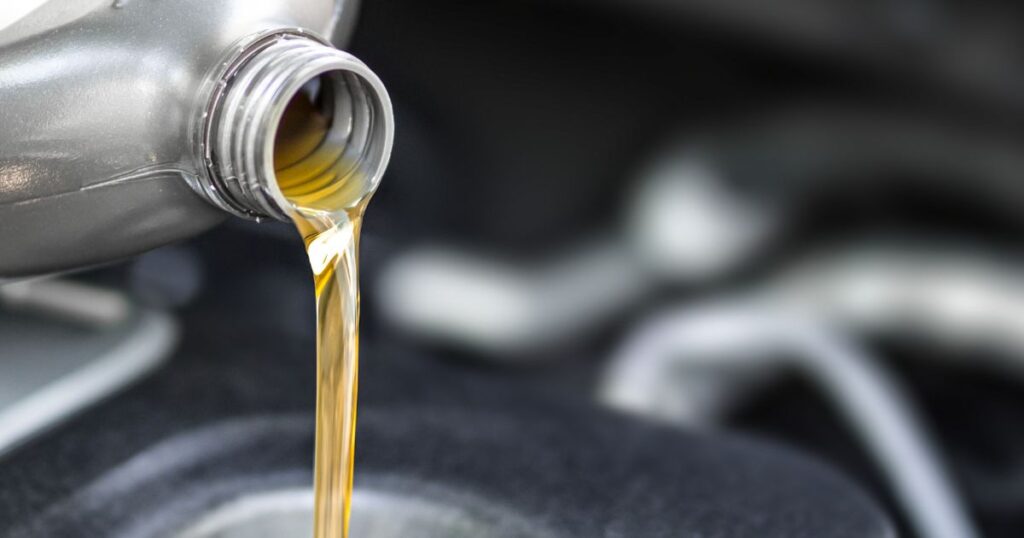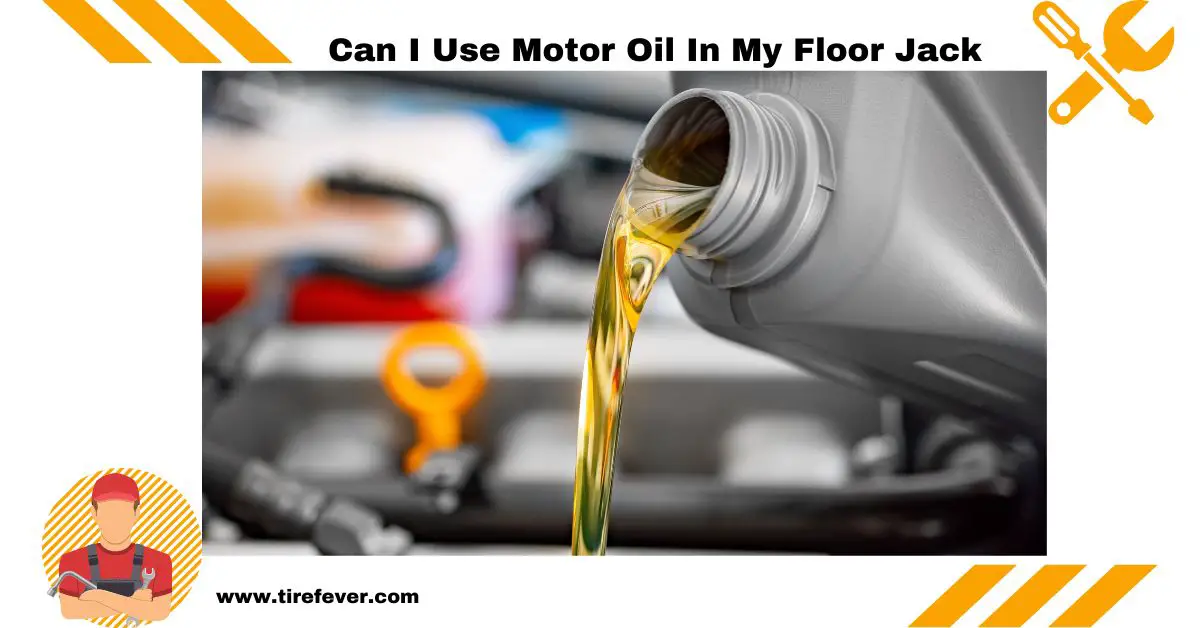A floor jack is a mechanical device used to lift and support heavy objects, such as vehicles. It consists of a hydraulic cylinder activated by a lever or a foot pedal, which moves a piston inside the cylinder to raise or lower the load.
The hydraulic fluid, typically a type of oil, is used to transmit the force from the lever or pedal to the piston, allowing the jack to lift and hold the load with minimal effort. But the day’s question is – can you use motor oil in a floor jack?
IN A HURRY??
In a hurry? Get the Best Floor Jacks on Amazon fast, with our handpicked selection of top-rated products….
– Best Overall – BIG Torin Hydraulic Trolley Service/Floor Jack with Extra Saddle
– Best On A Budget – Torin Hydraulic Low Profile Floor Jack with Single Piston
Can I Use Motor Oil in My Floor Jack?
No! The motor oil won’t work. While using motor oil as a substitute for hydraulic oil in a floor jack may seem tempting; it is not a good idea. Motor oil and hydraulic oil are different in several ways and are not interchangeable.
Using motor oil in a floor jack can lead to serious problems and even damage the jack.
One of the main differences between motor oil and hydraulic oil is their viscosity. Motor oil is designed to lubricate the internal components of an engine, such as the valves, pistons, and bearings. It has a relatively high viscosity, which allows it to coat and protect these moving parts.
On the other hand, hydraulic oil has a lower viscosity, which allows it to flow more easily through small passages and seals. The higher viscosity of motor oil may make it difficult to flow through the small passages and seals in the jack, leading to reduced performance and increased wear and tear on the jack.
Another issue with using motor oil in a floor jack is its compatibility with the seals and other components of the jack. Motor oil is formulated with different additives and detergents that may not be compatible with the materials used in the jack.
This can cause the seals to swell, leak, or even fail, leading to a loss of hydraulic pressure and lifting power.
Alternatives to Using Motor Oil in a Floor Jack
It is important to use the proper type of oil in a floor jack to ensure its proper operation and to extend its lifespan.
The best oil in a floor jack is a high-quality hydraulic oil specifically designed for hydraulic systems.
Hydraulic oil is available in various viscosities to suit different applications, so it is important to choose the right oil for your jack. Some alternative oils that can be used in a floor jack include:
Mineral oil:
This is a basic hydraulic oil that is made from refined petroleum. It has a moderate viscosity and is suitable for use in general-purpose jacks.
Synthetic oil:
This synthetic hydraulic oil is made from chemical compounds rather than petroleum. It has a higher viscosity than mineral oil and is more resistant to thermal breakdown and oxidation.


Synthetic oil is more expensive than mineral oil but can provide better performance and longer service life.
Food-grade oil:
This is a hydraulic oil formulated to be safe for food processing equipment. It is made from pure, food-grade mineral oil and contains no additives or contaminants. Food-grade oil is suitable for jacks used in food processing plants or other clean environments.
Other Oils That Can Be Used in a Floor Jack
In addition to the oils mentioned above, a few other oils can be used in a floor jack, depending on the application’s specific requirements. These oils include:
Biodegradable oil:
This is a hydraulic oil made from renewable resources and designed to be biodegradable. It is suitable for use in environmentally sensitive areas or where the risk of oil spills is high.
Fire-resistant oil:
The oil is formulated to resist ignition and extinguish fires. It is typically used in applications with high fire risk, such as in aerospace, military, and offshore drilling.
High-temperature oil:
Formulated to withstand high temperatures without breaking down or losing its lubricating properties. It is suitable for use in high-temperature environments, such as in foundries or heavy industrial applications.
Also Read: Can I Use A Floor Jack On Gravel?
How to choose the right oil for your floor jack
Knowing what type of oil is best for your machine can be tough with the current state of the floor jack market. But here are a few things you can consider during your selection to make the process seamless. They include:
Load-bearing capacity:
How much weight does your floor jack need to support? This is an important factor to consider when choosing the oil, as different oils have different load-bearing capacities.
You will want to choose an oil capable of supporting the weight of the objects you will be lifting with your floor jack.
Operating temperature:
Various oils have different temperature ranges in which they perform best. If your floor jack is used in a high-temperature environment, you may want to consider a high-temperature oil.
Similarly, if your floor jack will be used in a low-temperature environment, you may want to consider a low-temperature oil.
Type of seals and materials:
Different oils are compatible with different seals and materials. It is important to choose an oil compatible with the seals and materials used in your floor jack to prevent swelling, leakage, or failure.
Quality of the oil:
Use a high-quality oil that meets industry standards to ensure the best performance and longest service life for your floor jack.
Avoid using low-quality oils, as they may contain impurities or other contaminants that can damage the jack.
Also Read: Is It Safe To Jack Up One Side Of A Car?
Maintaining and Refilling the Oil in a Floor Jack
Proper maintenance and refilling of the oil in a floor jack are important to ensure its proper operation and to extend its lifespan. Some tips for maintaining and refilling the oil in a floor jack include:
Check the oil level regularly:
Inspect it monthly to guarantee your floor jack is functioning at its best. Doing so will ensure it has enough lubrication and won’t cause any issues down the line.
You can check the oil level by removing the oil fill cap and dipstick before replacing them to prevent contaminants from entering the hydraulic system.
Change the oil periodically:
Change the oil in your floor jack at least once every year or according to the manufacturer’s recommendation. Depending on the type of oil used, it may need to be changed more often.
Use only the highest caliber hydraulic oil made for use in hydraulic systems. For your safety, do not attempt to use motor oil or other oils that are incompatible with the jack.
Refilling the oil is easy – pour the correct amount into the oil reservoir and check that there are no leaks before using.
Keep the jack clean:
Regularly clean the exterior of the jack to remove any dirt, dust, or other contaminants. This will help to prevent the oil from becoming contaminated and will also help to extend the lifespan of the jack.
Store the jack properly:
When not in use, store the jack in a clean, dry place to prevent the oil from becoming contaminated or degraded.
You May Also Like: Why Won’t My Floor Jack Go Up [5 EASY Solutions]
Conclusion
In conclusion, using motor oil in a floor jack is not a good idea. Motor oil and hydraulic oil are different in several ways, and using the wrong type of oil can lead to serious problems and even damage the jack.
It is important to use the proper type of oil in a floor jack to ensure its proper operation and to extend its lifespan.
This post contains affiliate links. Read the full disclosure here.


I am passionate about all things automotive and have a deep understanding of the topic. As a mechanic, I use my free time to share knowledge of everyday challenges that any car owner can experience – helping you make informed decisions about tires.

